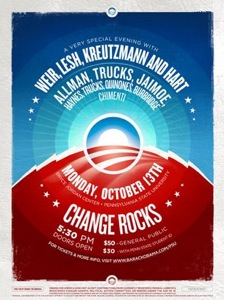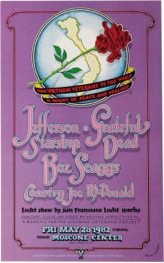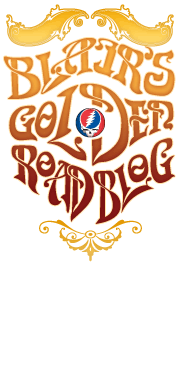By Blair Jackson
On the afternoon of April 26, 1988, in a nondescript room somewhere inside the Marin Veteran’s Auditorium building in San Rafael, Calif., Jerry Garcia and a couple of very articulate teenagers spoke at a press conference publicizing a Marin County-based social action group for high school students called Creating Our Future. The Jerry Garcia Acoustic Band was headlining a benefit concert at the Marin Vets for the organization that night. Also on the bill performing short acoustic sets were Brent Mydland, Bob Weir and Hot Tuna. (The encore featured Jerry, Bob, Brent and John Kahn playing Sam Cooke’s “Good Times” and The Beatles’ “Blackbird.” Very cool!)
A student leader said at the beginning of the press conference that one of Creating Our Future’s main goals was to register 18-year olds to vote in that fall’s election. Now, as happened a couple of times at other press conferences involving members of the Dead, the band’s publicist, Dennis McNally, prodded me in advance to ask the first question once the opening remarks were completed. Dennis, bless him, believed I might bring up something different than the conventional (straight) journalists who attended these sort of affairs usually did.
Seeing Jerry sitting alongside two or three fresh-faced students who had just extolled the virtues of voting and changing the world through political action, I couldn’t resist breaking the ice by asking something along the lines of: “Jerry, through the years you have said you never vote, you don’t trust leaders, and prefer to work outside the system for change. Yet, you’ve just heard these kids talk about the importance of voting and getting involved and how trying to work within the system does matter. Are you still planning to not vote this November, or have their arguments swayed you?”
There was a bit of laughter in the room and Jerry smiled nervously. His answer was a classic Garcia deflection. (I don’t have a tape, so I’m paraphrasing here): “Well, these are definitely the kinds of arguments that would make someone want to vote …” Then he talked about the virtues of the organization and such.
Jerry didn’t vote in that election (I asked him point blank two years later), nor in any other election, as far as I know. And as long as the Grateful Dead were around, they never endorsed a candidate as a group.
Twenty years later, however, with Jerry long out of the picture, The Dead (technically billed as “Weir, Lesh, Kreutzmann and Hart”) played a successful fundraiser/get-out-the-vote concert (10/13/08) for the Obama campaign at Penn State. Most Dead Heads who vote are Democrats (by a huge margin, I suspect, though I have no supporting data), and Democratic and Republican fans alike were happy The Dead were back. It had been four years since the foursome had played together (though, sans Bill, the others had staged a “Deadheads for Obama” concert in spring 2008), and many Heads hoped that the Penn State gig (dubbed “Change Rocks”) and a performance by The Dead at one of the Obama inauguration balls in January 2009, signaled that the band might go out on tour again—which they did, in spring 2009.

Poster for The Dead’s “Change Rocks” concert for Obama in 2008.
I was not surprised, however, that there was considerable chatter from a vocal minority on the Internet decrying The Dead’s decision to get involved with presidential politics. There were a lot of comments about Jerry’s refusal to vote and about the Grateful Dead’s supposedly apolitical stance through the years. “Jerry would be turning over in his grave to see the Dead re-forming for political purposes” was a notion proffered by some naysayers.
Would the Grateful Dead have played Obama benefits? Probably not, but we’ll never know. But whatever the decision might have been, it wouldn’t have precluded individual members from getting involved—as they did that night and as they always have.
The truth is, the Grateful Dead and its members were always involved in grassroots activism, if only by the company they kept and the causes they supported with benefits. From their beginnings in ’65 all the way until the end in ’95, their philanthropic spirit was usually directed toward local/community organizations and causes. One of their first gigs as the Grateful Dead was a benefit for the SF Mime Troupe at the Fillmore, and in the ensuing couple of years they played benefits for the Haight-Ashbury Legal Organization, the Straight Theater, the Spring Mobilization Against the [Vietnam] War, the Haight-Ashbury Free Clinic, the East Bay Economic Opportunity Program, the Black Man’s Free Store, the Zen Mountain Center, the Both/And jazz club, and so on. They mostly stayed away from blatantly political events, however, and distanced themselves from the radical fringe and, especially, any group that advocated violence. Still, there was no question about their countercultural leanings.

Artist Randy Tuten’s Poster for 1982 Vietnam veterans benefit.
Later, in the ’80s, they formed the Rex Foundation—whose board was populated by band members, crew and various friends and “family”—so the group would have an ongoing outlet for their philanthropic urges. That organization, which is still going strong 30 years down the line, has dispensed close to $9 million, mostly in grants of $10,000 or less, to thousands of nonprofit groups of every stripe, from women’s shelters to school music programs to environmental groups to the Gyuto Monks. The Dead also played a few big high-profile benefits in the ’80s—one supporting Vietnam veteran groups, another for SEVA, a third to raise money to save the vanishing rainforests, and they headlined a stadium concert to combat AIDS. Additionally, the individual members played many smaller shows for different organizations—like the Creating Our Future gig. That sort of low-key giving was much more the Dead’s style than the Big Gesture.
I love this verse in “Built to Last,” which seems to address the do-gooder’s dilemma:
There are times that you get hit upon
Try hard but you cannot give
And other times you’d gladly part
With what you need to live
Don’t waste your breath to save your face
When you have done your best
And even more is asked of you
Let fate decide the rest.
Bill Graham said in the Fall ’85 issue of The Golden Road: “When you get down to basic humanistic tendencies, going way back—whether it was voter registration, or a nursery school, a recreation center in Mill Valley, or when kids were getting busted in the Haight in the late ’60s … nobody has done more than the Dead … It gets down to: What do you do with the power you have? What do you do that you don’t have to do? And that’s an area that few people outside the Dead network know about the Dead.”
Musically, the closest the Dead came to “protest music” was “Throwing Stones”—which Bob insisted was anti-political—and Brent and John Barlow’s pointed ecology anthem “We Can Run.” Both of those came under fire from a segment of Dead Heads who really did not want to hear even well-meaning songs about real world issues. I could never figure out what message Garcia was trying to put across when he sang The Beatles’ “Revolution” 11 times between 1983 and 1990 (or exactly what John Lennon intended when he wrote it). I suspect he liked the payoff—“You know it’s gonna be alright!”— more than the litany of cynical putdowns in the verses. Even so, he never looked that comfortable singing it.
In 2012, the former members of the Dead continue to give their time and energy to myriad good causes, including the Rex Foundation and Phil and Jill’s Unbroken Chain Foundation. Bob always seems to be playing a benefit for someone, and Mickey and Bill have both been righteous in that regard, too. It’s who they are. It’s who they’ve been from the beginning. That’s Grateful Dead politics.



